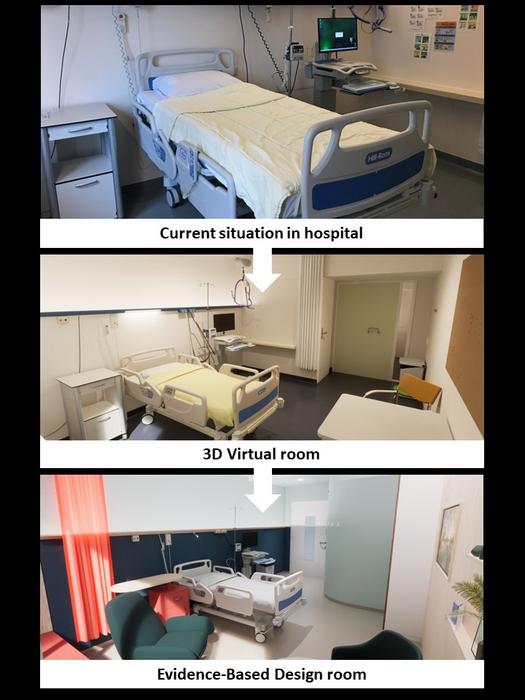In an online study, virtual hospital rooms designed according to the principles of evidence-based design or the principles of Feng Shui were associated with greater potential benefit for viewers than virtual representations of standard hospital rooms. Emma Zijlstra of Hanze University of Applied Sciences in the Netherlands and colleagues present these findings in the open-access journal PLOS ONE on June 5.

Credit: Emma Zijlstra, CC-BY 4.0 (
In an online study, virtual hospital rooms designed according to the principles of evidence-based design or the principles of Feng Shui were associated with greater potential benefit for viewers than virtual representations of standard hospital rooms. Emma Zijlstra of Hanze University of Applied Sciences in the Netherlands and colleagues present these findings in the open-access journal PLOS ONE on June 5.
Hospital designers might consider employing specific design principles in an effort to improve patients’ experiences. Growing evidence suggests there are beneficial outcomes from an approach known as evidence-based design. For instance, exposure to more daylight in hospitals is associated with lower stress and pain. Other well-known design approaches include Feng Shui, a Chinese system based on hypothetical energy flow, and the use of proportions following the golden ratio.
Despite these well-known options, experimental evidence on their relative benefits in hospitals is lacking. To help clarify, Zijlstra and colleagues randomly assigned each of 558 study participants to view online representations and information about a virtual hospital room designed with one of four approaches: Feng Shui, the golden ratio, evidence-based design or, as a control, a standard design from a real-life hospital. Only people who had previously been hospitalized at some point in their lives were invited to participate.
After experiencing the virtual rooms, participants completed a questionnaire that included standard measures of anxiety and other outcomes. Statistical analysis of their answers showed that, compared to participants who viewed the standard rooms, those who viewed rooms with evidence-based design reported less anxiety and greater senses of control, social support, distraction from negative thoughts, and pleasantness of the room.
Feng Shui design was not directly associated with lower anxiety, but participants who viewed the Feng Shui rooms did have greater senses of social support, positive distraction, and pleasantness of the room. There was no evidence for any benefits of golden ratio-based design.
On the basis of their findings, the authors suggest that rooms designed according to the principles of evidence-based design or Feng Shui might benefit patients. They note similarities between the two approaches, such as incorporation of greenery. However, they caution, it is unclear how well these online findings might translate to real-life hospital settings.
The authors add: “To our knowledge, this is the first and largest randomized controlled trial linking design principles, partly ancient and world-renowned, directly to anxiety in hospital rooms. This study showed that both Feng Shui and Evidence-Based Design are capable in effecting anxiety and it is important that large follow-up studies are conducted to examine the effect of specific design features.”
#####
In your coverage please use this URL to provide access to the freely available article in PLOS ONE: https://journals.plos.org/plosone/article?id=10.1371/journal.pone.0303032
Citation: Zijlstra E, Zwaag Bvd, Kullak S, Rogers A, Walker D, van Dellen S, et al. (2024) A randomized controlled trial of Golden Ratio, Feng Shui, and evidence based design in healthcare. PLoS ONE 19(6): e0303032.
Author Countries: The Netherlands, Singapore, UK
Funding: This study was funded by the Delta Prize (Deltapremie) number PR.01.2. This prize is a leading award for applied research at universities of applied sciences in the Netherlands (https://regieorgaan-sia.nl/taskforce-applied-research-sia/). Mark Mobach received this prize in 2019. The funders had no role in study design, data collection and analysis, decision to publish, or preparation of the manuscript
Journal
PLoS ONE
Method of Research
Experimental study
Subject of Research
People
Article Title
A randomized controlled trial of Golden Ratio, Feng Shui, and evidence based design in healthcare
Article Publication Date
5-Jun-2024
COI Statement
The authors have read the journal’s policy and have the following competing interests: Sabine Kullak is affiliated with the International Feng Shui Association. Ab Rogers and Dean Walker are affiliated with Ab Rogers Design (design studio). This does not alter adherence to PLOS ONE policies on sharing data and materials. These authors solely provided the design details in order to visualize the adaptations in the Feng Shui room and Evidence-Based Design room. They were not involved in any other aspect of the research process, such as methodology, data collection, data analysis or drawing conclusions from the data. Their contribution was limited to the conception of the work (i.e., providing design details of the FS and EBD room), reviewing the draft critically, and providing a final approval of the version to be published.



